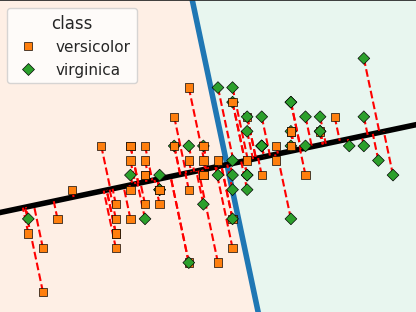Efficient models: reduce dimensionality with LDA in Python
Understand and implement Linear Discriminant Analysis (LDA), one of the best ML methods for dimensionality reduction in classification tasks. Dimensionality reduction is a fundamental machine learning technique that is frequently used to improve the performance of prediction models, interpretability, and data visualization. This easy-to-follow, hands-on project walks you through understanding LDA, when it's most useful, and how to implement this dimensionality reduction technique using Python.

Language
- English
Topic
- Machine Learning
Enrollment Count
- 82
Skills You Will Learn
- Python, Machine Learning, Data Science, Numpy, Pandas, sklearn
Offered By
- IBMSkillsNetwork
Estimated Effort
- 45 minutes
Platform
- SkillsNetwork
Last Update
- December 23, 2025
A Look at the Project Ahead
- Learn how LDA works
- Plot the LDA decision boundary for a binary classification problem
- Use LDA for classification
- Use LDA for dimensionality reduction
- Learn how to implement LDA using Python
What You'll Need
While having a basic grasp of statistics, data science, and/or machine learning is helpful for following along, it's not strictly required. The project is designed to be as accessible as possible to a general audience, with explanations primarily delivered in a graphical and intuitive manner. Whether you're a beginner just starting out, or a seasoned professional looking for a refresher on LDA, this hands-on project is for you!

Language
- English
Topic
- Machine Learning
Enrollment Count
- 82
Skills You Will Learn
- Python, Machine Learning, Data Science, Numpy, Pandas, sklearn
Offered By
- IBMSkillsNetwork
Estimated Effort
- 45 minutes
Platform
- SkillsNetwork
Last Update
- December 23, 2025
Instructors
Eda Kavlakoglu
Program Director, Technical Content at IBM
Marketing leader with a technical background in data science.
Read moreWojciech "Victor" Fulmyk
Data Scientist at IBM
Wojciech "Victor" Fulmyk is a Data Scientist and AI Engineer on IBM’s Skills Network team, where he focuses on helping learners build expertise in data science, artificial intelligence, and machine learning. He is also a Kaggle competition expert, currently ranked in the top 3% globally among competition participants. An economist by training, he applies his knowledge of statistics and econometrics to bring a distinctive perspective to AI and ML—one that considers both technical depth and broader socioeconomic implications.
Read moreContributors
Lucy Xu
Data Scientist
I am a Data Scientist Intern at IBM. I am also currently in my fourth year at the University of Waterloo studying Statistics with a minor in Computing.
Read more